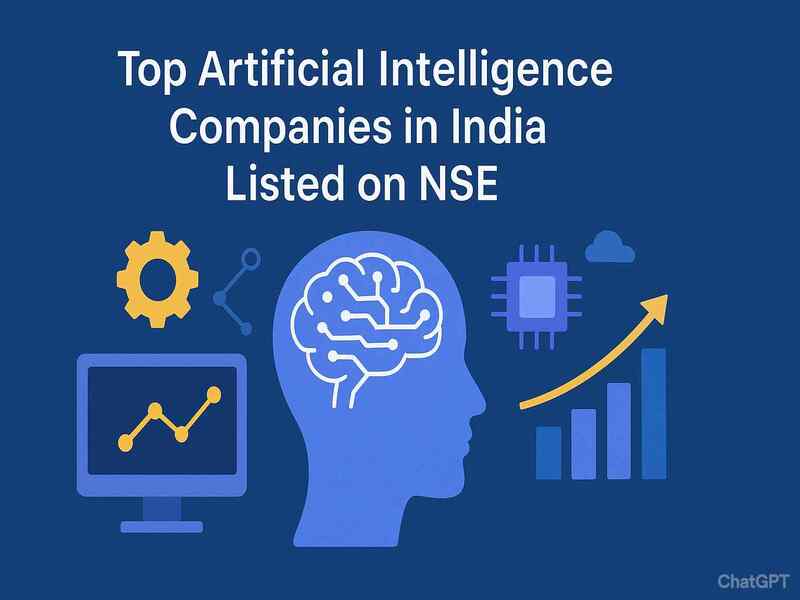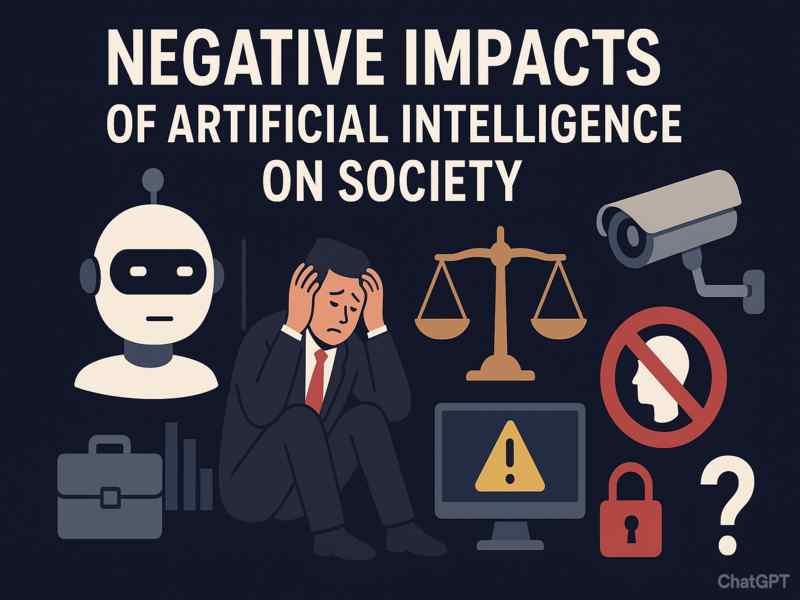Top Artificial Intelligence Companies in India Listed on NSE
India’s surge in artificial intelligence (AI) adoption has drawn attention to companies that are combining traditional IT services with AI platforms, automation, and data-driven technology. Many of these companies are publicly traded on the National Stock Exchange (NSE), and they offer investors a way to tap into the growth of AI stocks in India. This article examines the leading AI-oriented companies listed on NSE, what makes them stand out, market trends, risks, and what investors should consider before investing.
What Qualifies a Company as an “AI Company” on NSE?
To be considered a strong candidate under AI companies in India listed on NSE, a firm typically:
-
Incorporates machine learning, data analytics, or automation into its core business or service offerings.
-
Has research & development (R&D) or product segments specifically devoted to AI solutions, AI drivers, or AI-enabled technologies.
-
Demonstrates strong financials and good market capitalization among NSE listed firms.
-
Shows growth in AI-related revenues, partnerships, or contracts.
Using these criteria helps differentiate pure IT service providers from those more deeply leveraging AI.
Leading AI Companies on NSE: Market Leaders and Key Players
Here are some of the top Indian companies listed on NSE that are strongly associated with AI and automation (via services, products, or R&D). Data is drawn from recent market-cap rankings and performance metrics. Analytics Vidhya+4Forbes India+4CoinMarketCap+4
| Company | Stock Code (NSE) | Key AI/Automation Focus | Market Cap / Relative Strength* |
|---|---|---|---|
| Tata Consultancy Services (TCS) | TCS | AI platforms, digital transformation, consulting, cloud, automation | One of the largest tech firms in India with strong AI investment. CoinMarketCap+3Investing.com+3www.bajajfinserv.in+3 |
| Infosys Limited (INFY) | INFY | AI/data analytics (Infosys Nia), automation, machine learning solutions for enterprises | Consistently among the top companies by market cap. CoinMarketCap+3Forbes India+3Analytics Vidhya+3 |
| HCL Technologies | HCLTECH | AI labs, automation, cloud & infrastructure, enterprise AI offerings | High growth and strong global exposure. CoinMarketCap+1 |
| Tech Mahindra Limited | TECHM | AI-enabled IT services, telecom + AI integration, automation | Known for diversified services with AI components. Forbes India+2CoinMarketCap+2 |
| Tata Elxsi | TATAELXSI | Design & tech services, AI in automotive, media & health, embedded intelligence | Smaller than TCS/Infosys but strong in niche AI/embedded segments. Forbes India+1 |
| Persistent Systems | PERSISTENT | Data engineering, AI & IOT, digital transformation solutions | Mid-cap, but with focused AI / analytics offerings. CoinMarketCap+2www.bajajfinserv.in+2 |
| Oracle Financial Services Software (OFSS) | OFSS | AI in fintech, analytics, risk modelling, automation for banking sector | Deep domain expertise. Forbes India+2www.bajajfinserv.in+2 |
| Cyient Limited | CYIENT | Engineering, design and AI in embedded systems, smart products | Serves industrial/engineering verticals. Forbes India+2www.bajajfinserv.in+2 |
| Affle (India) Limited | AFFLE | Digital marketing + AI-driven targeting, predictive analytics | More niche, high growth. Forbes India+1 |
| Happiest Minds Technologies Ltd | HAPPSTMNDS | AI, cloud, automation, IoT, next-gen tech services | Emerging name for investors looking at growth in AI-adjacent sectors. icicidirect.com+1 |
*Relative Strength reflects market cap or growth metrics vs other AI/IT peers on NSE. Figures are indicative and subject to change with market movements.
Strengths & Competitive Advantages of These Companies
Diversification and Scale
Firms like TCS, Infosys, and HCL Technologies benefit from large scale, global client base, diversified service lines, and ongoing investments in AI/automation tools. Their breadth helps mitigate risk when one vertical (say, telecom or cloud) slows down.
Domain Expertise & Niche Focus
Companies such as Tata Elxsi, Persistent Systems, Cyient, and Oracle Financial Services Software often compete by delivering specialized AI solutions—for example, embedded AI, fintech analytics, smart product design, or IoT integration. This specialization enables higher margins and more defensible positions.
Innovation & R&D Investment
Innovation is crucial. Companies that maintain strong R&D (patents, labs, AI platforms) tend to introduce AI-driven products rather than just offer services. For instance, Infosys has its own AI platform; TCS invests in AI platforms and automation tools; persistent firms ramp up cloud/AI toolsets.
Government & Regulatory Tailwinds
India has been increasing support for digital transformation, AI policies, and startup ecosystems. Government initiatives help by encouraging public-private partnerships, funding, and more favorable regulatory frameworks. This contributes to stronger growth prospects for Indian AI stocks. Forbes India+1
Risks & Considerations for Investors
While the potential is significant, there are also several caveats to keep in mind:
-
Valuation Pressure: Many AI-oriented companies trade at high Price-to-Earnings (P/E) or Price-to-Book ratios due to growth expectations. Overvaluation risk is real if performance lags.
-
Competition: Globally, US, China, and other markets have strong AI challengers. The ability of Indian companies to keep up in R&D, scale, and technical talent is crucial.
-
Technology Obsolescence: AI advances fast. Companies must continuously update their capabilities (e.g. large language models, edge AI, neural inference) or risk becoming outdated.
-
Regulatory & Ethical Issues: AI involves data privacy, bias, algorithm transparency. Regulations (both domestic & international) may force changes or impose costs.
-
Dependency on Global Demand: Many Indian AI/IT companies derive revenue from overseas clients. Exchange rate fluctuations, global economic slowdowns, or trade/risk issues can have outsized effects.
Comparative Table: Key Metrics of Top AI Companies
Here is a comparison of some important metrics (market cap, recent return, P/E) for selected AI-related companies on NSE, as of latest available data. (*Figures are approximate and subject to market changes.)
| Company | Recent 1-Year Return* | P/E Ratio* | Focus Area (AI / Automation) |
|---|---|---|---|
| TCS | ~20-30 % | ~25-30x | Broad AI + consulting + automation |
| Infosys | ~15-25 % | ~20-25x | AI platforms, ML, analytics |
| HCL Technologies | ~25-40 % | ~30-35x | Enterprise AI, cloud, infrastructure |
| Tata Elxsi | ~30-50 % | ~50-60x | Embedded AI, automotive, design |
| Persistent Systems | ~25-40 % | ~40-50x | AI/DX (digital transformation), product engineering |
*Numbers indicative; investors should verify latest financial reports and NSE filings.
Recent Trends & What’s Driving Growth
-
AI-as-a-Service: More Indian firms are offering AI/ML platforms, pre-built models, and analytics tools as services. This shift reduces dependency on custom projects and boosts recurring revenues.
-
Cloud & Edge AI: Edge computing, IoT, and embedded intelligence are getting more important. Companies like Tata Elxsi, Cyient, and technology arms of TCS/HCL are leveraging these.
-
Strategic Acquisitions: Some firms are acquiring smaller AI startups or AI-specialist firms to build competencies more quickly than in-house R&D might allow.
-
Global Contracts & Partnerships: Collaboration with international firms in healthcare AI, autonomous vehicles, or industrial automation helps exposure and revenue diversification.
-
AI Regulation & Government Policies: Policies around data protection, AI ethics, and skill development are becoming more important. Incentives, subsidies, or regulation may favor companies with good AI governance and privacy practices.
Real-World Example: How AI Is Embedded in Operations
To illustrate, let’s look at TCS and Infosys in action:
-
TCS has developed tools to automate back-office operations for financial clients, deploy intelligent document processing, and provide predictive analytics for supply chain.
-
Infosys with its Infosys Nia platform helps customers build predictive models, automate workflows, and apply machine learning to improve customer experience.
These use cases show how the AI capabilities of listed companies on NSE are not just in labs but increasingly embedded in service delivery.
How to Evaluate & Choose Among These Stocks
If you’re considering investing in top artificial intelligence companies in India listed on NSE, here are steps to build a thoughtful strategy:
-
Analyze Financial Statements: Revenue growth from AI/automation segments, R&D spend, margins.
-
Check Management & Vision: Leadership’s track record with innovation, ability to attract/retain AI talent.
-
Look for Partnerships & Clients: Global or marquee clients using their AI products.
-
Valuation vs. Growth: Compare P/E, PEG (price/earnings to growth) ratios. A stock may have high valuation but strong growth expectations.
-
Monitor Regulatory Changes: Data laws, AI governance rules, export/import of tech, etc.
Shortcomings & What Often Gets Overlooked
-
Labeling vs Reality: Some firms market themselves as “AI companies” even if only a small part of their operations uses AI. It’s important to check what percentage of revenue or operations is truly AI-driven.
-
Talent crunch: Hiring and retaining AI specialists is expensive. Companies lagging in talent may lose competitive edge.
-
Infrastructure costs: AI computing, GPUs, cloud costs, data storage, etc., are expensive. These costs reduce margin unless scale is achieved.
-
Global headwinds: Macro-economic risks, interest rates, supply chain issues can affect costs and demand.
Closing Perspectives
While no single company may dominate every aspect of AI in India, some clear stars have emerged. Infosys, TCS, HCL Technologies, Tata Elxsi, and Persistent Systems offer compelling combinations of scale, domain expertise, and growing AI capability. Investors who look closely at AI revenue sources, partnerships, innovation pipelines, and valuation metrics are better positioned to navigate volatility. Over time, firms that consistently deliver AI value—not just promise—are likely to lead in both market performance and technological impact.




